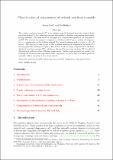Classification of congruences of twisted partition monoids
Abstract
The twisted partition monoid PΦn is an infinite monoid obtained from the classical finite partition monoid Pn by taking into account the number of floating components when multiplying partitions. The main result of this paper is a complete description of the congruences on PΦn. The succinct encoding of a congruence, which we call a C-pair, consists of a sequence of n+1 congruences on the additive monoid N of natural numbers and a certain (n+1)×N matrix. We also give a description of the inclusion ordering of congruences in terms of a lexicographic-like ordering on C-pairs. This is then used to classify congruences on the finite d-twisted partition monoids PΦn,d, which are obtained by factoring out from PΦn the ideal of all partitions with more than d floating components. Further applications of our results, elucidating the structure and properties of the congruence lattices of the (d-)twisted partition monoids, will be the subject of a future article.
Citation
East , J & Ruskuc , N 2021 , ' Classification of congruences of twisted partition monoids ' , Advances in Mathematics , vol. In Press . https://doi.org/10.1016/j.aim.2021.108097
Publication
Advances in Mathematics
Status
Peer reviewed
ISSN
0001-8708Type
Journal article
Description
Funding: The first author is supported by ARC Future Fellowship FT190100632. The second author is supported by EPSRC grant EP/S020616/1.Collections
Items in the St Andrews Research Repository are protected by copyright, with all rights reserved, unless otherwise indicated.

